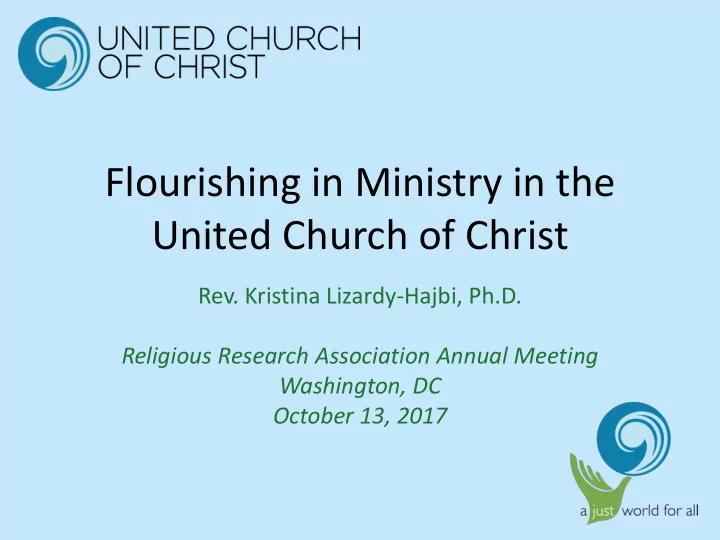

Flourishing in Ministry in the United Church of Christ Rev. Kristina Lizardy-Hajbi, Ph.D. Religious Research Association Annual Meeting Washington, DC October 13, 2017
Overview • Flourishing in Ministry Survey—University of Notre Dame Wellbeing at Work Project – Survey Dates: February 7-17/28, 2017 – Total Respondents: 1,264 – Complete Report and Summary Report Available at www.ucc.org/research under “Statistics and Reports”
Key Findings • Ministers spend an average of about 48 hours per week engaging in ministry-related work. • Despite these positive findings regarding wellbeing, in the past year over half (53%) of UCC ministers/ MIDs have seriously considered leaving pastoral ministry at least once or twice, sometimes more often. • 85% report at least a moderate amount of stress in their ministry work, with some reporting a lot of stress. • Over one-third reported that the income from their ministry work alone was not sufficient to meet their family needs.
Data Exploration • Are there differences between white and non- white/multiracial ministers on wellness measures?
Differences by Race Std. Mean Sig. Wellness Measure Deviation Emotion White 10.47 2.931 .081 Regulation Non-White 10.98 3.113 Proactivity White 9.76 2.865 .003 Non-White 10.60 2.956 Self Control White 8.61 2.926 .004 Non-White 9.45 2.991 Relationships White 21.41 5.986 .026 Non-White 20.08 5.539 Homogeneity of variances exists for each of these measures.
Proactivity Items Mean: Mean: White Non- White No matter what the odds, if I believe 3.36 3.61 in something, I will make it happen. I excel at identifying opportunities. 3.71 3.90 If I believe in an idea, no obstacle will 3.14 3.49 prevent me from making it happen.
Self Control Items Mean: Mean: White Non- White I wish I had more self discipline. 3.30 3.15 I have a hard time breaking bad 3.10 2.67 habits. I am good at resisting temptation. 3.40 3.62
Relationships • White ministers feel cared for, accepted, and supported by their clergy friends and congregation to a greater extent than non-white/ multiracial ministers. • Non-white/multiracial ministers feel cared for, accepted, and supported by their spouse/ partner, other family, non-clergy friends, and denomination leaders to a greater extent than white ministers.
Ministry Income and Race 120.0% 98.4% 100.0% 87.4% 80.0% 60.0% White 35.6% Non-White 40.0% 25.6% 20.0% 0.0% Receives income from Ministry income sufficient to ministry work meet family needs Differences displayed in chart are statistically significant.
Differences by Race • Non-white/multiracial ministers find it more difficult to live on their total household income in general. – Not At All Difficult: White – 52.0%; Non-White – 39.8% – Very/Extremely Difficult: White – 4.0%; Non-White – 11.7% • In addition, greater percentages of non- white/multiracial ministers serve more than one church.
Conclusions? Non-white/multiracial ministers scored higher on proactivity • because they have developed skills for achieving their goals despite institutional/societal roadblocks—they are more persistent in their pursuits and excel at seeking out opportunities. Non-white/multiracial ministers may also feel they have more self • control (i.e., are more disciplined and focused) than white ministers for these same reasons around necessary skill development for overcoming oppression. Despite these skills, non-white ministers still face roadblocks to • receiving income for their ministry work and being able to support their families on ministry income. This may be because many non- white congregations struggle financially. In a majority white denomination like the UCC, it is more difficult • for non-white ministers to feel cared for, accepted, and supported by clergy colleagues and their congregations.
Applications • Provides further evidence of needed support for non-white/multiracial ministers—peer groups, leadership/pipeline programs, financial support initiatives, etc. • Helps lead to the development of resources around eliminating bias and ensuring equitable/fair compensation for church search committees.
Rev. Kristina Lizardy-Hajbi, Ph.D. Director, Center for Analytics, Research and Data United Church of Christ hajbik@ucc.org UCC Flourishing in Ministry Report: www.ucc.org/research
Recommend
More recommend